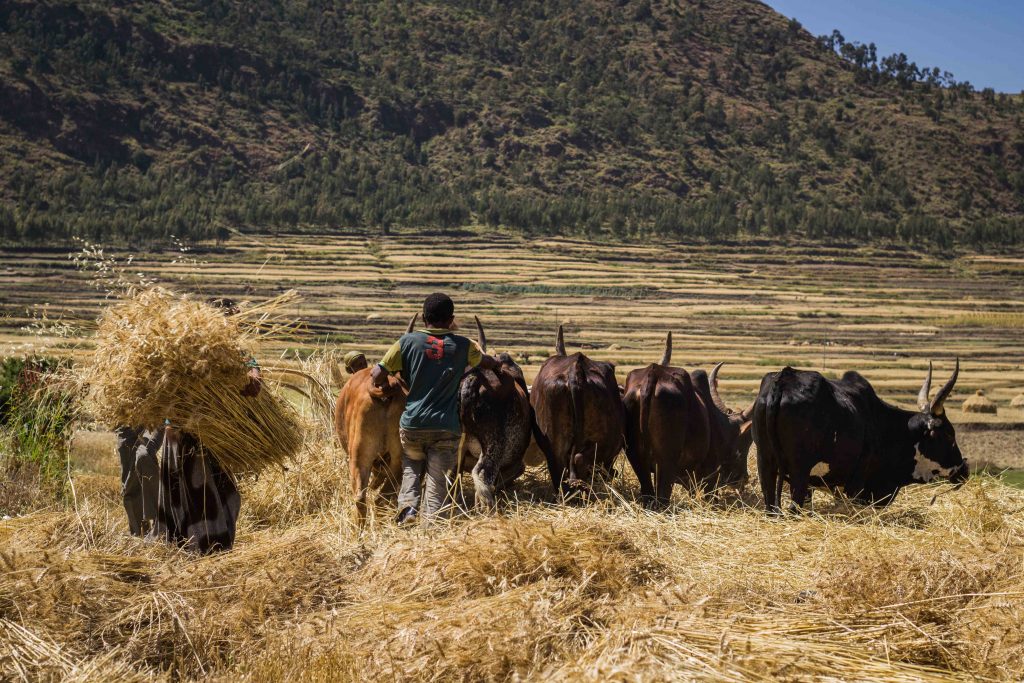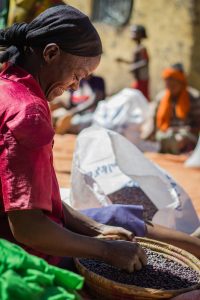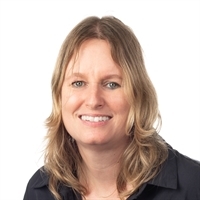Seeds for Africa
Farmers in African countries lose up to 50 percent of their potential yield due to bad seed or even ‘fake seed’. Wageningen scientists are working with local farmers, research institutes, companies, NGOs and government to develop a stronger seed sector. In the context of ISSD Africa, they ensure more effective markets and quality control systems. They also look at how farmers can obtain new crop varieties and produce more varied crops.
“Farmers in Africa lose out on tens of millions of euros every year because they use seed that has poor or no germination capacity,” says Wageningen researcher Marja Thijssen. There is a lot of seed of poor quality and even ‘fake seed’ on the market, where, for example, seeds are mixed with grain and repackaged with copies of real logos. High quality seed requires good starting material, good production lines and good storage options. In many countries, such as Uganda, the government provides certification that larger seed-selling companies can benefit from. Local farmers who grow seed, however, rarely achieve this certification. “The certification service is namely located in the capital,” Thijssen explains. “There are only a few inspectors, and they do not get out to all the regions. Logistics are difficult and expensive.”
Seed sector
A solution has been found in Uganda: a decentralized quality system has been set up in which regional inspectors inspect and certify seed. “That works very well, which is why we are now looking at how we can apply this type of system in other countries,” says Thijssen. Thijssen and her colleagues work together with local farmers, companies, NGOs, governments and research institutes under the umbrella term ISSD Africa, which stands for “Integrated Seed Sector Development”. Wageningen University & Research (with Thijssen as strategic advisor) manages ISSD Africa, which works on nine seed issues including policy, quality, diversity, markets, climate change, gender, disasters and fragile states.
Local seed banks
Since 2010, ISSD Africa has focused on the development of the seed sector in 16 Sub-Saharan African countries, including Ghana, Ethiopia, Uganda, Mozambique and Burundi. In many countries, agricultural yields are not even half of what they could be despite the fact that greater agricultural production helps combat malnutrition and famine. It is crucial to increase production, also because of the growing population and climate change. The changing climate brings with it, for example, drought, shifting seasons, pest infestations and new crop diseases, all of which can seriously threaten overall production. Thijssen says, “remote communities can set up local ‘seed banks’ themselves, which guarantee a wider range of varieties and crops, which allows farmers to better respond to changes.”

Photography: Four Corners
Emergency seed in the event of disasters
African farmers also sometimes lose their seeds due to disasters such as floods, droughts and conflicts, in which case the government often provides farmers with emergency seed. The harvest of the Ethiopian peasant Maliya Yuya, for example, was destroyed by frost. “I get my income from planting potatoes. I could not have survived without emergency seed potatoes,” says Yuya in a video from ISSD Africa. But she does not know where the seed comes from and how good it is. According to Thijssen, bad seeds can destroy more than they save. “Poor seed from unadjusted varieties is regularly distributed free of charge, which not only results in a low or unsuccessful yield, but also disrupts the local seed market. It is better to get seed from the local region than to use seed from far away and unknown sources.”
Improvements: smaller bags and seed tuktuks
Furthermore, better seed varieties cultivated by research institutes now often remain on the shelf. “The seeds must first be propagated. That takes a few seasons, during which the companies make no money from it,” explains Thijssen. The Wageningen researchers think that could change when governments start granting licenses to seed producers for the propagation and sale of specific varieties. They are also working on a better interplay between supply and demand. Thijssen offers a case in Ethiopia as an example, where “smaller, 2 kg bags of seed are now being offered in addition to the 10 or 15 kg bags that are far too large for small-scale farmers.”
“ Een project in Ethiopië heeft gezorgd dat maar liefst 3,5 miljoen boeren kwaliteitszaad in handen kregen. En in Uganda zagen we de leefomstandigheden van boeren sterk vooruitgaan door gebruik van beter zaad. Dankzij de hogere opbrengsten kunnen ze een huis bouwen of hun kinderen naar school sturen.”
Seed distribution can also be improved: the situation now is that farmers often send someone to the city to get whatever seed happens to be for sale there. One alternative is the ‘seed tuktuk’ now popular in Ghana: a seed expert rides a cart full of quality seeds around rural communities, selling them to farmers and informing them about their use. Thijssen reports that “the farmers seem to appreciate the seed tuktuks very much.”
Better living conditions

Photography: Four Corners
Many of the projects under the ISSD umbrella are successful. “For example, we see that a project involving seed production in Ethiopia has ensured that no fewer than 3.5 million farmers were given quality seed,” Thijssen outlines. “And in Uganda we saw a sharp improvement in the living conditions of farmers through the use of better seeds. Thanks to the higher yields, they can build a house or send their children to school.”
Thijssen emphasizes that professionalization is needed throughout the entire chain, from seed production, seed distribution and seed trade all the way to the field. “Although every country is unique, they often have to deal with similar challenges. A lot is being invested to find solutions. Within ISSD Africa we look at what works where, then we map out how it can work elsewhere too, by rescaling and making adjustments.”
Different perspectives
ISSD’s method of working is oriented to both small-scale farmers and larger-scale agricultural companies, as well as to governments that can make a big difference with their policies, legislation and regulations. “There is room for everyone and we embrace the different perspectives. ISSD helps to bring about changes that serve all the stakeholders, without having its own agenda,” emphasizes Thijssen. The initiative is therefore widely supported not only by the Dutch Ministry of Foreign Affairs but also by the African Union.
Read more:
- Short video about the spread of good planting seeds among farmers in Ghana (3 min., subtitled in Dutch)
- Website of ISSD Africa with interesting short films (see the middle of the homepage)
- Download the special of Vice Versa about seeds for small-scale farming from 2017. On page 9 is an article about ISSD Africa and on page 12 over high quality seed in Uganda.
- Brochure of the Netherlands ministry of foreign affairs about the international activities of Nederland in the area of seed.
- Read this article in Dutch


Good day dear Marja, I have seen your name as a senior advisor in agrobiodiversity and seed systems at Wageningen University & Research. In fact, I would like to apply for a PhD scholarships opportunity through the Partnerships between the Netherlands and South Africa. It is required to have one supervisor in the Netherlands, hence, I need your advice regarding the name of potential supervisors in agronomy so that I can contact them and start to prepare my research proposal. Thank you
I am interested
Nice seeing how community seed bank works in some countries
Thank you for your interest in our work Zeleke. Please have a look at our ISSD Africa website (see the link indicated above), where you can further specify your interests.
Thank you Kayembe, for your interest in doing a PhD at Wageningen University. I would like to learn more about the Netherlands-South Africa partnership for PhD students. I will follow up with you personally.
Promotion of good seed is important..In this context farmers need to be educated…. but how? It’s a long term goal, first farmers should be educated how they can grow their own seeds , specially for OPs , common crops needed to be found first, and focus should be given on vegetables first…. and then they will realise the importance of seed in their life. Gradually the popularity of hybrid seed will come . Then seed should come in venture state….
Thank you for your response Habib. I agree that promotion of quality seed is important, and so is training of farmers on how to make optimal use of the potential of quality seed through using appropriate growing practices. Some seed companies indeed start with the introduction of OPs, followed by hybrids. For crops like maize the use of hybrid seed is already common practice in many countries. Farmers use seeds for different crops from different sources or seed systems. With ISSD interventions we want to increase farmers’ seed choice.
My e mail was wrong . It is armanredwan1424@gmail.com
Promotion of good seed is important..In this context farmers need to be educated…. but how? It’s a long term goal, first farmers should be educated how they can grow their own seeds , specially for OPs , common crops needed to be found first, and focus should be given on vegetables first…. and then they will realise the importance of seed in their life. Gradually the popularity of hybrid seed will come . Then seed should come in venture state….
Dear Marja, I am a PhD student here at WUR in the Social Sciences Group. I think this is very relevant for the farming communities in Ethiopia where I am from. I know that farmers from my community travel long distances each year to access specifically potato seed (Bellete) developed, I think, with the support of WUR project. I am wondering how it is possible to help these farmers: any tips or even discussion in person?
Thank you for your message Getu. I will give you the contact details to get in touch with our colleagues in Ethiopia, working in the ISSD Ethiopia programme.
It is a very amazing article.
I am glad to see this article.
I think I should visit this blog more.
– http://www.88meh.com/
improved seeds are the key in yield result. I need your support in agricultural skills
Thanks maria for making this platform. I am currently a Msc student in wageningen University. I would like to work on adaptation mechanisms of farmers for climate change. I am from Ethiopia and would like to do my thesis there too. Is there a project that I can attach to?
This is a very interesting and important topic for Africa. I am Eritrean and currently studying my Masters in Emplant plant breeding program and mainly focusing on seed production, processing and distribution. I would like to participate in this project as my masters thesis if there is a slot available, I am very much interested.
Hoi marja’
Ik werk in Sierra leone en vroeg me af of ISSD ook in Sierra Leone actief is?
Hi, all is as well. I found this issue on seed very interesting and highly educative and what interest me much is the integrated seed sector development (ISSD)
I find this publication very interesting and informative.
Thank you for your comments Ibrahim and Mohammed. You may also find the article in the latest issue of Wageningen World interesting: Better seed brings progress to Myanmar; an interview with my colleague Abishkar Subedi about our ISSD Myanmar programme: https://issuu.com/wageningenur/docs/ww2020_01_eng/30
That is interesting, you are welcomed
Thank you very much
This is very educative and intresting
Very much interesting and that is what we really need in Africa, more grease to your elbows.
Good and quality seeds result in the yield of any cultivation… the need of having quality seeds in Africa and developing countries is enormous… the ISSD Africa is doing a great job to see the challenges of having good seed is resolved… thanks a lot to all those hands on deck.
Thank you for comments seed colleagues. I see that one of you is working for East-West Seeds. You may find the study interesting, which we recently did in the context of our ISSD Uganda and ISSD Africa programme. We do action research on the topic: how to create farmers’ demand for quality seed. The study looks at the farmer training approach of East-West Seeds for promoting quality vegetable seeds in Uganda: https://issdafrica.org/2020/02/24/adoption-processes-of-good-horticulture-practices-in-northern-uganda/
Very educative article
Interesting article and great work. Particularly like the innovation of the seed tuk tuks and recommendation of smaller sizes for seed packs.
I am curious is ISSD currently working in Nigeria?
Thank you for your comments! We did some interesting work in Nigeria, where we facilitated the development of the National Seed Road Map for Nigeria. Find the project brief at: https://issdafrica.files.wordpress.com/2020/03/nigeria-seed-sector-review-fourth-final-brief-16032020.pdf
The brief has a link to the road map document. We hope to become active in Nigeria through the Nigeria-Netherlands Seed Partnership soon.
Seed is life,a great and good job well done real It’s the right for our farmers have quality seed in order to improve their livelihoods.
?
Quite a commendable stride, keep it up
Very interesting article about how quality seeds can help to combat poverty. Also, the most important part of the yield comes from the seeds.
This is a welcome development and the information should be channel to farmers as they are always ready to learn new things and how best to use quality material even some of these quality seeds are highly expensive which most attimes beyond the purchasing power of the farmers.
Forinstance, in Northern Nigeria where most agricultural activities are carried out, the farmers have poor accessibility to quality seeds due to their high costs and technology of using them. They need to be enlighten about the importance of embracing quality seeds and dangers associated with using local seeds considering the growing population and climate change as highlighted.
It is a good development, the system Will contribute a lot to our Nigerian farmers. Good vegetable crop production start with quality seeds which ends in bumper harvest
Even in Nigeria ISSD can work with government of Nigeria through Ministry of Agriculture to produce quality seed
Through Research Institutes under the Federal
ministry of Agriculture
Interesting the link between technologies like, improved seeds and production techniques and improved livelihoods. However lower costs of improved seeds is at the heart of higher adoption rates. Any model that can contribute in this respect will go a long way.
This is very interesting
This is very nice so inspiring a welcome development as well
Welcome development
It a very good development and very educative am looking forward to them.
Very nice piece
This development is very commendable.
Not only commendable but highly important to our African communities
Very informative. Nigeria farmers should be trained on this.
Great innovation
Without good seeds farming will be useless but with good seeds and good recommendation farming is live .
Farming business has to do with good quality seeds for the goals to be successful
I recommend ISSD to work with nigerian Goverment to improve and supply qualitative seed
Having discussed with our vegetable crop farmers about the ISSD, that will be introduce to west Africa.majority of them stated joblleting about the system and will welcome the system as well.
Yes, its true to say a fresh seed from the reliable source gives you better yield. Therefore you are highly welcome.
This is nive and informative. Thanks
Dear colleagues, this may be of interest to you: next week Tuesday 9 June we will organize a webinar on adoption processes of good horticultural practices in Uganda. You can register through the following link: https://issdafrica.org/2020/05/26/webinar-june-9-creating-demand-for-quality-seed-adoption-processes-of-good-horticulture-practices-in-northern-uganda/
To be sincere, i really appreciate your reports, i have been nursing an ambition to become a farmer and i don’t know how to go about it for years now. i don’t mean a subsistence farming, but commercial one. and i need some materials that can (read) guide me on the type or kind of products to grow at a time (season) and where (what kind of conditions in terms of soil condition and other necessary facts to know concerning farming and all other agricultural products.
Thanks for sharing such amazing information . I hope you keep on sharing such kind of useful information daily.
It’s the great courage of the common man.
Benedict Cumberbatch as Greville Wynn is superb.
I applaud the amazing performance on the inside and the outside. 스포츠중계
His 2012 Tinker Taylor Soldier spy.